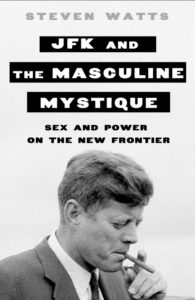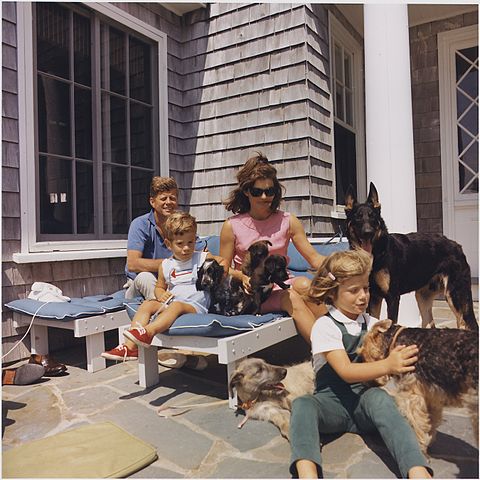by Steven Watts
In 1959 JFK stood as a youthful political leader, with an allure more akin to that of a movie star or popular singer at the forefront of a movement to overcome a crisis of masculinity in postwar America. A host of movies, books, magazines, and social commentary in the late 1950s presented the modern male as a weary, conforming businessman trudging aimlessly through a bureaucratic maze, growing soft from the consumer abundance of suburban life, and suffering emasculation by newly aggressive women. JFK promised regeneration by promoting a bracing image of the American man in public life as youthful and individualist, cool and vigorous, intellectual and tough-minded, assertive and a sexual conquistador.

John F. Kennedy Bumper Sticker during his election campaign in 1960. Image is in the public domain via Wikimedia.com
But digging deeper this is a more interesting dimension to the Kennedy story: he did not work alone in shaping the powerful masculine mystique of the New Frontier, but was joined by a group of kindred male spirits, famous in their own right, who pursued a similar agenda of masculine revitalization. The members of the Kennedy Circle, as I termed them, were interconnected with one another as well with the young leader whose candidacy they supported.

Connecting with the Kennedy ‘s
During the presidential election of 1960, this group included JFK’s strong supporters Frank Sinatra and the Rat Pack, the hip entertainers whose legendary Las Vegas shows were making them the epitome of masculine cool. The novelist and essayist, Norman Mailer, with his outlandish macho sensibility, joined in by penning an influential essay in the 1960 contest idealizing JFK as the nation’s charismatic, sexy leading man. Ian Fleming, the popular British author, became a Kennedy favorite and friend, deploying his popular James Bond character as a literary twin to the young American politician.
Read more about the power of JFK’s masculine influence on America here
Hugh Hefner, the controversial editor and publisher of Playboy, not only became a strong JFK supporter but made his magazine into a clearing house for the efforts of the Kennedy Circle as it lionized Sinatra and his gang, regularly featured Mailer’s writings, and became the first venue to serialize the James Bond books. All of these figures helped enhance candidate Kennedy’s vigorous, sophisticated masculine persona.

Masculinity as President
After JFK assumed the presidency, several other figures moved forward to join the Kennedy Circle and promote its agenda. Ben Bradlee, the handsome, debonair newspaperman for the Washington Post, became a Kennedy confidant while polishing in print the president’s vigorous masculine image. Generals Maxwell Taylor and Edward Landsdale, who became trusted advisers in the White House, translated Kennedy’s manly ethos into a military doctrine of counterinsurgency where heroic and unorthodox individuals, not hidebound bureaucracies, carried the brunt of the international battle against Communism. Hollywood actors Kirk Douglas and Tony Curtis became presidential allies and made one of Kennedy’s favorite movies, Spartacus, into a Cold War allegory of manly resistance to authoritarian power. Finally, the Mercury Astronauts, particularly John Glenn and Alan Shepard, became presidential favorites as they personified the Kennedyesque male’s physical courage and intellectual sophistication in exploring the new frontier of outer space.
The Kennedy Historical Wave
The efforts of the Kennedy Circle reveal a deeper truth for understanding the past. Despite the “great man” theory of history, no single individual changes the shape or direction of human affairs, either now or in days gone by. Broad social, cultural, and economic forces often push leaders forward to positions of prominence as they catch the crest of powerful historical waves. And nearly always, supporters and associates of these leaders assume important parts in defining issues, developing strategies, and promoting images. JFK’s kindred spirits, in the late 1950s and early 1960s, played just such a role as they helped make the youthful leader into the most popular president of the twentieth century.
STEVEN WATTS is an award-winning professor of history at the University of Missouri. He has been a consultant and on-screen expert for several documentaries. Appearing on PBS, the History Channel, NBC, CNBC, CBS, Bloomberg News, and Fox. He is the author of JFK and the Masculine Mystique.
